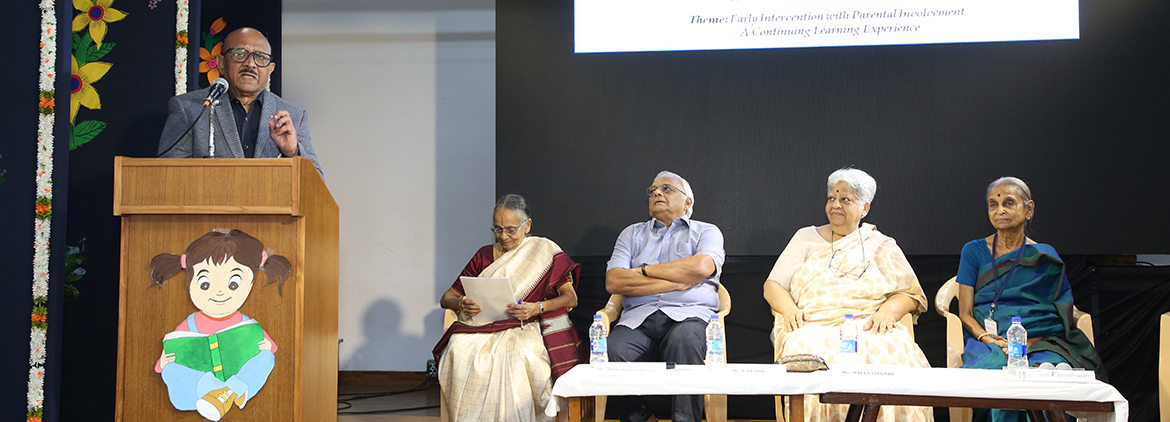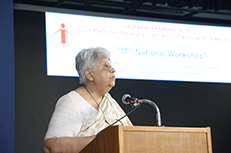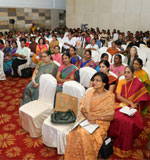


The National Workshop organized by MNC was the 17th in the series and MNC has all along been conducting its National Workshops on Early Intervention in Intellectual Disability and Associated Conditions with focus both on medical and early intervention training aspects. The theme of the Workshop this year was “Early Intervention with Parental Involvement – A continuous Learning Experience.”
The Importance of Early Intervention for Disabilities which encompasses early detection, Identification and programming has been well established over the past 6 decades, more so since the 60’s of the 20th century. Several studies have been undertaken on the efficacy of early identification and providing services at the earliest as also on the feasibility of involving parents in the training of their children. Madhuram Narayanan Centre for Exceptional Children (MNC) has been providing early intervention services to children with intellectual disability over the past 34 years, with zero rejection and with total parental involvement and continues to be committed to the cause. In the deliberations of sessions at the Workshop, MNC presented a sharing of experiences by experts who, with their immense repertoire of expertise in the area of multiple aspects of development, provided hands on experience for all the delegates, and, in particular, to all service providers.
The topics taken for presentation during the conference were :
 Session 1 : Presentation 1
Session 1 : Presentation 1
The Importance of and Urgency for Early Intervention, presented by Mr. S Krishnan, Hony. Joint Secretary, BMKT and Advisor MNC. Mr. Krishnan said that Early Intervention is important is a statement agreed in all forums but its urgency has become critical now. Quoting 2011 census he said that 8.2 lakhs children are with Intellectual disability and that the proportionate Early Intervention centers are not there. There lies the urgency. A cost effective accessible model with uniform intervention programme is the need of the hour. An Early Intervention Centre within a radius of 4 -5 kms in every residential area is a must if every child with disability can have access to early intervention. Also the curriculum in all the Early Intervention centers must be identical so that the child has seamless continuity in case he is compelled to shift residences. Clear direction must be provided to the parents post identification of development delay/disability in the child as to what they have to do next.
Session 1 : Presentation 2
Importance of Special School Education : Post Early Intervention, presented by Mrs. Priya Rajkumar, Head-Education of Maithree Special Schools. Speaker Mrs. Priya emphasized the importance of special school education for post Early Intervention. The special school serves the unique learning needs of the differently abled, provides equal opportunities for all, and ensures that all students regardless of their abilities receive an inclusive and holistic education. The objective of special school is to develop functional competence in the performance of daily living skills through IEPs, facilitate a smooth transition from education to employment and harness their potential and fruitfully contribute to society.
Session 2 : Presentation 1
Creating Public Awareness on the Importance of Identifying the Special Needs in Children Reaching out to services in Early Intervention, presented by Dr. Rema Chandra Mohan, Director and Professor of Pediatrics, Institute of Child health Madras Medical college, Chennai. She threw more light on the significance and importance of Early Stimulation. She stated that effective early intervention works to prevent problems occurring or to tackle them head on when they do, before the problem gets worse. It also helps to foster a whole set of personal strengths and skills that prepare a child for adult life. Early Intervention services can be preventive, curative, supportive or remedial. In whichever way EI is very important.
Session 2 : Presentation 2
Strengthening the General Health of Child - Medical Intervention with Parental Awareness on Timely and Regular Health Needs - presented by Dr. Padmalochani, Developmental Pediatrician, Consultant, MNC, Chennai. Her presentation was all about right parenting and its impact. The impact of parenting is greatest during the earliest years of life when the brain is developing rapidly and all of its experiences are created by parents and family environments. The takeaway from her presentation was “children who experience poor quality care either in a center or in their home are likely to have significant difficulties with overall development and performance in school. High quality child care, responsive caregivers, enriched environment and stable patterns of care giving are positively associated with good developmental outcomes.”
Session 2 : Presentation 3
Reaching out to Homes of Children with Counseling Parents on Interventional Needs - presented by Mrs. Muthuperiyanayaki, a parent and special educator at MNC. Drop out is a very common but dangerous word for a special child who drops out of EI. It leads to regression and the child loses out on EI which is essential. ‘MNC through Project Sankarshana suggests solution to parents to face the drop out. The project aims at counseling parents and members of the family to come back into the fold of EI. Persistence, patience and determination to reach the child are suggested to help children get EI rightfully.
Session 2 : Presentation 4
Inclusion with integration into Mainstream Education - presented by Mrs. Preethi Krishnan, BMKT. Her presentation was on Inclusion and Integration into mainstream education. In the context of education inclusion means that students with diverse needs, such as those with disabilities, learning differences or special needs are educated alongside their peers in regular or mainstream classrooms, rather than being segregated into separate settings. She stressed that the multidisciplinary team of school management, parents, students, main stream teachers, shadow teachers, therapists and ancillary staff must all work in tandem.
Session 2 : Presentation 5
Documentation - The Need and Its Value for References for a Seamless Refining of the Early Intervention Programming System - Upaneeta - presented by Mrs. A Hemalatha and Miss C Thenmozhi of MNC. They stressed the need for documentation. It is needed at every stage of any process and helps a comprehensive and well-organized documentation can be referenced at any point in time. Documentation helps tracking the progress, helps effective communication, decision making, and future references. Documentation defines accountability, eliminates duplications work, saves time, sets standards, maintaining uniformity, satisfies legal requirement.
Session 3 : Presentation 1
Early Intervention Approach for Skilling and Occupations in Adulthood - presented by Mrs. Janaki Balakrishnan, Ph.D.,Board Member, VHS, Navjyothi Trust, Andhra Mahila Sabha Mitra Mandir, Chennai. She said that Vocational training preparation should be long term, intensive and a continuous effort. It can begin at home and should have transitional plans to take it further. The transitional plan must identify goals for work, further education and community living that reflect actual opportunities and resources that are likely to be available after the student leaves school and are achievable by the student given appropriate support. It should define the action n3ecewsay year by year to help the student achieve his or her goal and clarify the roles and responsibilities of the student, family and others in carrying out these actions.
Session 3 : Presentation 2
Policies, Schemes and Benefits from Government - Central and State in the services in the field of disability - presented by Mrs. Sheeba Anand, Audiologist and Speech Therapist, State Resource and Training Centre, (SRTC), Chennai. She gave a elaborate list of state and central government schemes for the differently abled and how to access and avail them. She gave the website and the URL to access those websites and almost all schemes had to be availed on line. Her presentation was very useful to our parents.
Session 4 : Presentation 1
Building supports from the versatility of Communication - Nuances for Social Interaction - A Thematic Demonstration - presented Ms. Shalini M–Speech Therapist MNC, Ms. Anu Narayan - Movement Therapist - MNC, Ms. Andal K-HOD, KYM Mithra, Krishnamacharya Yoga Mandiram and Guided By - Ambika Kameshwar., Ph.D., RASA, Chennai. The demonstration was done by children of MNC.
Session 4 : Presentation 2
Physical Health and Fitness : With Physical Education and Play Therapy for creativity in children with Special Needs - A Thematic Demonstration - The demosntration was done by MNC children.
Session 4 : Presentation 3
Providing Need Based Affordable and Accessible Assistive Devices for Freedom in Mobility- presented by Dr. S Sunder, Director MIOT Rehab Centre, Chennai. He made an elaborate presentation on :
Each subject was illustrated with clear pictures of how they have to be made and used. He gave a list of aids that can be obtained easily and used effectively even in rural areas. Of course the west is far ahead of us in the use of aids and appliances for the disabled but slowly India is catching up.
Session 4 : Presentation 4
Inclusion - to become Meaningful with Occupational Training for Children with Multiple Disabilities - presented by Dr. K Balabaskar, HOD and Lecturer in Department of Adult Independent Living, NIEPMD. He gave a comprehensive list of Government departments that help the disabled with schemes for training and how to approach them. He also gave a list of checklists that must be used for students over 14 to help them decide their way forward in vocations.
Session 5 : Presentation 1
Dreams to Become a Reality - Jivikam, presented by Mrs. M Sumathi and Ms. Sarojini of MNC. Among the population of children in the age group of 6 - 18 who attended Early Intervention in MNC nearly 20 to 30% of the children have multiple disabilities. Our experience is that every child benefits from early intervention services, depending on the type of disability level and age of the child. Some of our children have moved over to school education and beyond. Others with problems in mobility and unable to seek occupational training beyond their residences, also require to be reached MNC therefore ran for children with multiple disabilities a project Socially Useful and Productive Activity.(SUPA) giving them specialized intensive, intervention services, and discovered their untapped potential, to make them occupationally active. Three years of service had a satisfactory outcome and led to the next stage. The result was JIVIKAM Skill Development Centre for children 6+ to 18+ years of age. This is how the dream for a Vocational training for children after EI took shape and the presenters explained in detail how they are implementing it.
The Chief Guest for the valedictory function was Mr. K Kamal Kishore IAS, Director, Department for the Welfare of the Differently Abled, who accepted the recommendations the emerged from the deliberations of the workshop and gave his assurance that he will try his best to implement them.